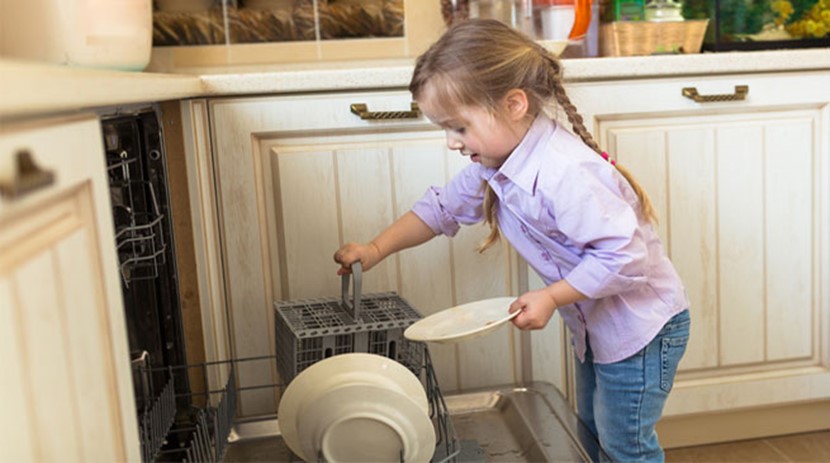Getting kids to help around the house

Are you sick of picking up after your child? Get him to do it himself - along with a number of other toddler-friendly household chores, explains early childhood educator Cheryl Dennis.
One of the things two of my three grown-up children still complain about is the fact they had to do the dishes when they were younger. One would wash, the other would dry, and they'd both put them away. By the time their youngest brother was old enough to help out, we had bought a dishwasher. Decades later, the older two still complain about how unfair it was that their little brother didn't have to spend ages up to his elbows in a sink full of dishes.
It's a privilege of parenthood that we can tell our kids what to do (within reason, of course). We're in charge of their development, and it's one of our duties to guide our children to behaving like responsible members of our family and our society. When they are ready, both physically and emotionally, it can be really rewarding for both parents and children to give little ones the opportunity to help out around the house. What may start out as us telling them what to do will soon transition into helping children feel like they are really contributing members of the family, working together for the good of their family "team". This not only fosters independence, it helps them to learn skills that will serve them well throughout life. And the bonus is that you won't have to do quite so much picking up after their messes if they're cleaning up themselves!
To encourage your child to participate, start by making their chores into a game, shower them with praise, and remember that their standards are different. With a little practice over time, you may be surprised at how much "live-in help" you have.
Each child's level of skill and physical ability is different, so there is no hard and fast rule of what they can do at a particular age, although the following are general guidelines as to what might be appropriate from about the age of two up to five. Try to work with your child as soon as you notice he can follow directions. It may be as early as 18 months of age, and long before they can talk. Keep in mind that younger toddlers often can't follow multiple directions at once, so you might have to modify your instructions into individual parts that they can easily keep track of. As your toddler matures, he will be able to follow multi-part instructions, such as, "Open your backpack, take out your lunchbox, and put it on the kitchen bench."
When you're thinking of implementing some chores for your child, give him at least a week to master one skill, with your supervision and assistance when necessary, before introducing a new one. Once the first skill is mastered, you can add another, and another, and keep building on their abilities and encouraging them to extend themselves just a little bit more. Be prepared for accidents and mistakes, and continue to praise their efforts. You might have to clean up after them for a little while longer while they get the hang of things, but this will change over time and with gentle persistence.
From about age two, toddlers may be able to:
- Pick up toys and put them away

- Brush their own teeth (with assistance)
- Hand you laundry pegs as you're hanging out the washing
- Get their own shoes/coat/backpack when it's time to go out, and get shoes/coats for other family members
- Act as "messengers" between Mummy and Daddy, carrying notes and short verbal messages, as well as carrying items from one parent to the other
- Wash their face/hands with a wet facecloth you've prepared
- "Scrub" the inside of the bathtub or floor of the shower with a cleaning sponge and mild dish soap or water
- Put things away in hidden places (closets, cupboards, drawers)
- Help sort dirty laundry by colour and put it into the washing machine with your help
- Help sort clean laundry by type, i.e. "My clothes", "Mum's clothes", "Towels" - they know whose shirt belongs to whom
- Feed the dog or cat using a measuring cup ("Give the dog one scoop in his bowl")
- Undress themselves and put dirty clothes in the hamper
At this age, don't concern yourself with results. It's all about reinforcing the experiences and following directions. Keep smiling as they look to you for praise. Remember that two is a very young age and some of these skills may not be mastered for a couple of years, but it's okay to start working on them now. Three-year-olds have increased physical abilities and are a bit steadier on their feet, as well as are better able to grasp items in their hands and manipulate objects.
From about age three, toddlers may be able to:
- Empty small wastepaper baskets into a large one
- Empty the cutlery basket from the dishwasher and put the cutlery into drawers (just make sure to remove knives first)
- Carry dishes and items to the table (let them go ahead and carry one item at a time, as they don't mind making multiple trips!) and set the table
- Pick out clothes and dress themselves
- Bring dirty laundry from the hamper to the laundry room
- Learn to make their own bed in the morning
- Wash their own hands and face at the sink
- Tidy up their bedroom or play area
- Start to comb or brush their own hair
- Fold laundry (even if it's not perfect)
- "Help" with meal preparation - children love to mix and stir, and if you are chopping ingredients, they can put them from the cutting board into the cold pan or mixing bowl
- Get their own breakfast in the morning - keep the cereal and milk in a place that's easy to reach
- Clear dirty dishes from the table to the kitchen bench
- Wipe up spills
From the age of four, children have better communication skills, and can follow more complicated directions. They're also becoming adept at reaching things on shelves using stools, putting pieces together, and taking initiative with tasks that they can do. If you make certain chores a part of their daily routine, they will remember how to do them and will only need brief reminders of what comes next - and sometimes they'll remind you!
Four-year-olds may be able to:
- Dust furniture (especially with old socks on their hands!)
- Close windows and doors
- Put dishes away on low shelves
- Water plants
- Pick out their own clothes, dress and undress themselves
- Help choose groceries from the supermarket shelves and place them in the trolley
- Help put groceries away at home
- Get out ingredients for meals
- Pack their own lunch box from pre-made ingredients
- Fill their own glass or water bottle
- Help with the care of younger children (fetching nappies and clothing, gently rocking the bassinet, entertaining the baby while you supervise)
- Put toys and books away tidily
- Collect rubbish bags from the small rubbish bins around the house
- Pick up rubbish in the driveway or lawn
- Pull weeds
- Know the difference between various household cleaners (and know that they may only handle them with supervision)
- Clean the TV screen and mirrors with glass cleaner and paper towels
- Help run the vacuum
- Shake out rugs
- Put clothing away neatly in their drawers
By the time your child is five years old, they have reached a very helpful age, as they've mastered many skills and enjoy helping out. Make the most of this before puberty strikes! They will use many skills when they are at school, so this is the time to really help them to shine.
Five-year-olds may be able to:
- Make toast and simple sandwiches
- Help to tidy other rooms
- Help to change their sheets and bedding
- Read picture books and sing songs to younger siblings
- Set and clear the table
- Help to serve guests (especially little friends who come over for lunch!)
- Ice cupcakes and cakes
- Sort out clothes that don't fit from their own drawers and closets, ready for donating to charity
- Tidy the bathroom after use, and hang up wet towels
- Brush their teeth on their own
- Wash and rinse their own hair
- Pour drinks for the family at meals
- Help clean the toilet and bathroom
- Answer the telephone with good manners
- Mop the floor with help
- Help to load the dishwasher
This is by no means a definitive list, and you'll undoubtedly find many more chores that are specific to your own family! But it will give you a general idea of what you can let your child try. If he has a hard time and gets frustrated, try something else, and go back to the original chore in a few weeks' time. But always let your child try a task, especially if he asks you.
The time you invest now will be well worth it in the long run, and remember to always praise their efforts above all else.
Cheryl Dennis is an early childhood educator with over 30 years of experience in the classroom. She is a mother of three and a grandmother of four. Her grown-up daughter still loathes doing the dishes.


